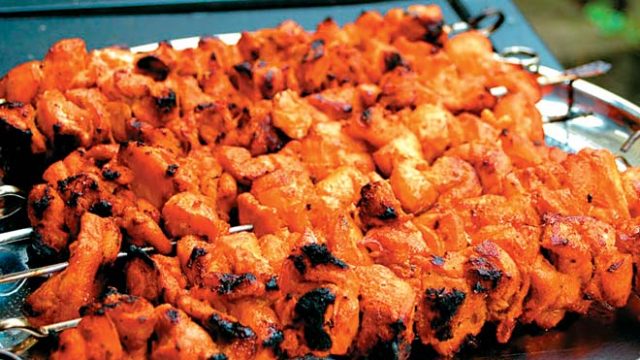I was warned that I stood no chance: there was temptation at every street corner and I would crumble like a dry leaf. The holy city of Amritsar has many wily tricks to test your resolve — lively bazaars, beautiful phulkari, colourful jootis, exquisite jewellery — but none quite as irresistible as its legendary cuisine. Lucknow has its tundey kebab, Banaras has the monopoly on paan while Agra boasts of petha. Amritsar is famous simply for ‘food’.
Everyday recipes are crafted to such perfection that it’s hard to pick a favourite. From morning till evening, Amritsar has a dish for every time of day. There is something for every mood and craving, something for people with a sweet tooth and something for those who like it hot, something for a wintry morning to thaw your insides, or to cool you down on a hot afternoon. The alleyways and crowded backstreets of Amritsar are bursting at the seams with handcarts, holes-in-the-wall and traditional halwai shops dispensing gastronomical delights. Navigating these narrow lanes under a tangle of electric wires is quite an adventure.
Who better to explore Amritsar with than the poster boy of the city’s rich culinary traditions? Celebrity chef Vikas Khanna was born and raised in Amritsar and he has firmly established Punjabi cuisine on the global gourmet map. In his book, Amritsar: Flavours of the Golden City, he chronicles his journey from his grandmother’s kitchen, across the Atlantic to the coveted Michelin star, and the return home. He credits his culinary wizardry to his childhood acquaintance with tastes and textures, and the deep love he has for his hometown and its rich legacy of food.
The book is the definitive street food guide for Amritsar, an account of the city’s history and its institutions, plus handpicked home recipes, all rolled into one. Sharing family anecdotes, Khanna makes a case for unpretentious, robust food infused with the tingly feeling of well-being and the goodness of hearty, home-cooked meals. He also reveals his favourite haunts around town. On his recommendation, I sample what feels like a week’s worth of food on my sojourn to Amritsar.
Later, I only have vague recollections of the landmarks I visited on the trip — Golden Temple (spotless), Jallianwala Bagh (red brick walls), the Beating Retreat at Wagah (patriotic Bollywood songs in the background). On the other hand, images of the food I devoured are all sharp and detailed — the glistening, syrupy gulab jamun, the crackle of crisp-yet-moist kulchas, the startling freshness of spiced paneer, the tangy sweetness of sticky aam papad.
Dainty portions? Delicate flavours? A hint of this and a pinch of that? No, thank you! You can save that routine for uppity fine dining affairs. On the streets of Amritsar, food is prepared and shared king-size. Nowhere is this philosophy more enthusiastically embraced than at the magnificent Golden Temple, which serves food to thousands of visitors every day by any conservative estimate. The mammoth scale of the dining area is an awesome sight. I doubt I’ll ever again see such a huge collection of plates — they were stacked to twice my height and passed between hands in a hypnotic assembly-line. Inexplicably, tears rolled down my cheeks and I looked around, embarrassed, before I spotted a small mountain of chopped onions with kitchen workers busily adding to the pile. Unsurprisingly, the langar, especially the kada parshad are delicious.
Nearby is Company Bagh, which is famous for its eponymous laddoos that aren’t laddoos at all. These lentil dumplings eaten with pickle are certainly not sweet — they get their name because of their round shape. While you are here, be sure to sample the excellent badam doodh of Durga Ice Cream near Lohgarh gate.
Lured by the promise of mouth-watering champ, I scoured the parking lot of Shastri Market to find a nameless cart that sells grilled lamb chops. Historically, ‘chaamp’ comes from an Irish word of the same spelling, which means ‘to pound’.
After this, I made for Maqbool Road, which is synonymous with kulchas — thin, crispy crust on the outside, while the inside is soft and creamy. Bo Wale Kulche in Basant Avenue are named after their funny smell, thanks to their double fermented dough.
Amritsar has other novelties like the flat gulab jamuns of 75-year-old Sharma Sweets (opposite DAV College on Lawrence Road). The delightful peda lassi, which is basically liquid peda, is also unique to Amritsar. The Ahuja Lassi Shop on B.K. Dutt Gate has in fact perfected five flavours of the humble lassi since 1955. I was transfixed as I watched a worker expertly juggle jets of thick, frothy lassi without missing a beat or spilling a drop. Gian Chand’s Lassi Shop opposite Regent Cinema is another Amritsari institution.
Gajar ka halwa is such a popular dish that it’s sold on handcarts in the market places, something you won’t find anywhere else in India. One of Amritsar’s best-kept secrets is the bhel puri sold under the famous Bhandari Bridge, right before entering Hall Bazaar. If you come this way, stop at Durga Sweets to pick up some methi matthi. You can also pack the trademark Amritsar padad and wariya for home from Manjith Mandi, and the unique anar dana papad from Papadwala Bazaar, which you can fry or roast to enjoy its sour taste.
An iconic fixture of the city is the century-old Kanha Sweets on Lawrence Road. Locals swear by their chole kulche and their signature jaggery halwa. Another old favourite is Beera’s Chicken opposite Bhandari Hospital, which has been around for an impressive 85 years. I only had to sink my teeth into the succulent chicken tikka and masala tandoori murgh to understand why.
So old are these establishments that their history is wrapped up in the story of Amritsar itself. In a city with such a glorious culinary legacy, you don’t need a special occasion to celebrate — every day in Amritsar is a veritable feast.




